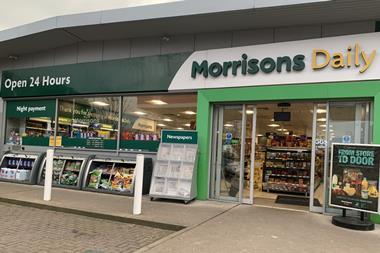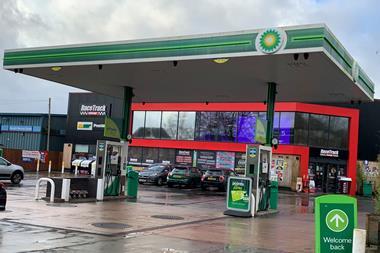Petrol retailer Paul Sykes probably sums up what most in the industry thought when they read the Competition Commission’s latest report on the UK grocery market. "It came as a disappointment - but not a surprise," says the Shaws Petroleum managing director. "It shows that they haven’t a clue about what’s really going on."
The Commission issued its Groceries Market Investigation last month, marking the end of a 21-month inquiry into the £120bn sector. It suggested that not only did the UK not have too many supermarkets, but it could even make room for a few more.
This finding was among a raft of provisional recommendations and remedies contained in the report, many of which have been met with a less than favourable response by those in the forecourt industry.
Industry groups fear that even after all this time in the planning, the recommendations do not go far enough to stop the march of the supermarkets, and may make matters worse for the independent retailer.
Some of the main changes in the long-awaited report, announced on February 15, include:
l advising the government that it should provide for a new ’competition test’ - which local planning authorities will have to refer to when they are assessing planning applications for new large grocery stores. The Office of Fair Trading (OFT) will be given an advisory role as a statutory consultee;
l putting together a range of measures aimed specifically at ending the use of restrictive covenants on land or buildings that could be developed or used by competitor grocery retailers. Supermarkets often attach these covenants to land they buy and sell to prevent rivals using it to build stores;
l replacing the Supermarket Code of Practice with a new Grocery Supply Code of Practice. This will be extended to include all grocery retailers with a turnover greater than £1bn. It will require them to appoint an in-house code compliance officer and ensure better record keeping. This will be policed by a new ombudsman, dedicated to supermarkets and other businesses of that size, who will follow up complaints and breaches of the new code.
The recommendations come amid increasing concerns over the growing dominance of the big four supermarkets: Tesco, Asda, Sainsbury’s and Morrisons.
But while experts in the industry welcome certain recommendations and changes, they have slammed others - even labelling them "bizarre" and "timid". James Lowman, chief executive of the Association of Convenience Stores (ACS), says: "This inquiry has run for nearly two years and it is extremely disappointing that the proposed remedies are so timid. There is a very real problem in this market and the measures recommended go nowhere near far enough."
Lowman says that overall, the inquiry had not concentrated on the fuel sector enough.
"In my view, the Commission takes a very narrow view of what to look at in the retail market -there should have been more focus on the fuel side of things," he explains. "Both supermarkets and independent forecourt traders sell fuel, and the display of fuel prices is massively important in marketing your business.
"Also, what about vouchering and cross-subsidising? These are all relevant to the grocery sector, and can prove detrimental to smaller businesses."
The ACS planned to make a submission to the Commission outlining these and other points by the March 7 deadline.
Lowman also expresses concern over other points in the report.
He describes the ACS’s reaction to the competition test proposal as "cautious", saying it could create loopholes that would let supermarket developers impose their will against what local people want.
He is also worried about the OFT’s increased powers. Regarding the Grocery Supply Code of Practice, he says: "The decision to extend the scope of the Code of Practice is bizarre. The Code was created to check the power of the companies that operate from a dominant position in the market and exert buyer power over suppliers. To extend the scope beyond the Big Four is to ignore the fact that their dominance is greater now than when the code was created, the differential in terms of price has extended from 13% in 2000 to 16% as found by this inquiry. Extending the scope of the code will not address the imbalance of buyer power that exists between the Big Four and everyone else."
However Lowman sees the creation of an ombudsman as positive, saying that it could help forecourts get a better deal on the goods they buy because the appointment aims to curb the buying powers of the major multiples. But only if the ombudsman is given enough power. He says: "I fear that the ombudsman will be window dressing, but maybe, just maybe, suppliers will be stirred from their paralysis of fear, use the ombudsman, and gradually start to address the buyer power that the Commission has identified but is sadly too timid to tackle. We will have to wait and see."
Petrol Retailers’ Association director, Ray Holloway, is equally philosophical about the report, saying that as usual with official documents, it depends on "interpretation and application". And he doubts the report will make any real difference to the industry in the short term.
He adds: "The report probably came out stronger in its recommendations than I thought it was going to. But even so I don’t think it will make any difference in the short term. The supermarkets will just look at the areas where they aren’t very well represented, and apply to build a store there.
"Also, there doesn’t seem to be any definition of market share, for example, does it take smaller stores like Tesco Express into account? If there are five Tesco Express stores and one Tesco supermarket in the same area, how does this work? The original report said it wouldn’t include the convenience sector. This could prove to be a potential threat to the industry.
"The inference also seems to be that there should be more supermarkets to prevent more competition - this is obviously something any small retailer will be delighted to read!"
Holloway expects that this report will only be the tip of the iceberg, saying there will be more on this issue as the impact on the market of Tesco and the other big three supermarkets increases.
The final report into the UK groceries market is expected to be published at the end of next month, shortly before the legal deadline of May 8.
But the final word should probably go to Paul Sykes: "The Commission has done countless reports on the industry, and they come up with this. They’re twits, in my opinion. At some stage this will affect my business and the business of other retailers. Let’s just hope the local authorities are more sensible about this than the Commission."
----
=== the key recommendations: ===
? A ’competition test’ should be set up which the local planning authorities would refer to when looking at planning applications from supermarkets. The Office of Fair Trading would have an advisory role as a statutory consultee.
? No changes to the planning system such as the ’need’ test or the ’town centre first’ policy.
? Major changes to restrictive covenants - retailers must release restrictive covenants on land use and further covenants will be banned. This means supermarket rivals could apply to open a store on such land or in buildings.
? The Supermarket Code of Practice will be replaced with a new Grocery Supply Code of Practice, extended to cover grocery retailers with a turnover of £1bn.
? An ombudsman will be appointed to follow up complaints and investigate any code breaches. ? Supermarkets would have to have in-house compliance officers and ensure better record keeping.





























No comments yet